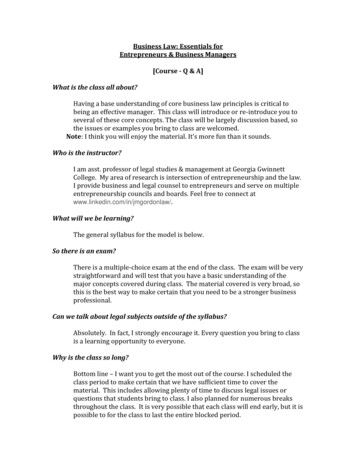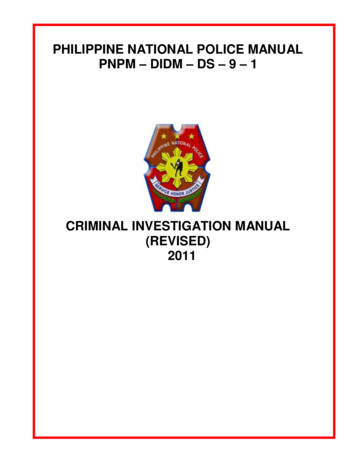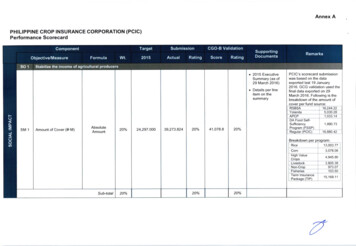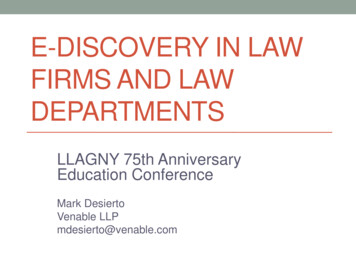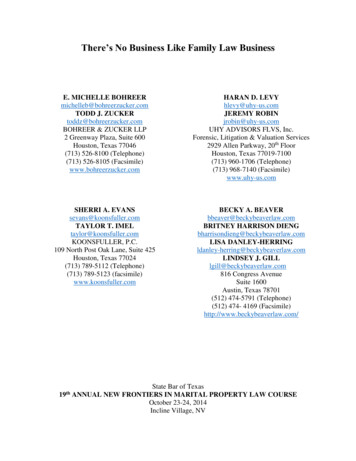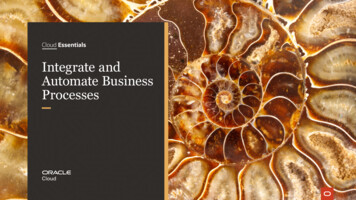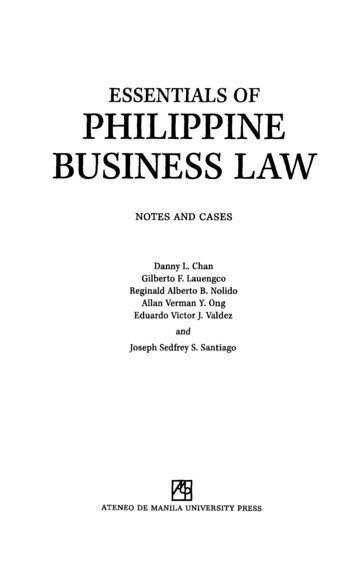
Transcription
ESSENTIALS OFPHILIPPINEBUSINESS LAWNOTES AND CASESDanny L. ChanGilbert» F. LauengeoReginald Alberto B. NolidoAllan Verman Y. OngEduardo Victor J. ValdezandJoseph Sedfrey S. SantiagoREATENEO DE MANILA UNIVERSITY PRESS
CONTENTSPrefacexxiOBLIGATIONS AND CONTRACTSTITLE ONE / ObligationsChapter One: General ProvisionsArt. 1156Elements ofan ObligationJuridical necessityArt. 1157Art. 1158Art. 1159Art. 1160Negotiorum gestioSolutio indebitiOther quasi-contractsArt. 1161DamagesInstances ofbad faithArt. 1162Chapter Two: Nature and Effect of ObligationsArt. 1163Art. 1164Delivery of the fruitsArt. 1165Thing to be deliveredDeterminate thingV335788111416161718
Indeterminate thingRemedies of the Creditor/ObligeeFailure to deliver determinate thingFailure to deliver indeterminate thingLiability ofdebtorforfortuitous eventArt. 1166Art. 1167Art. 1168Art. 1169Elements of legal delay or defaultDemand on the debtorExceptions to the general ruleEffects of delayArt. 1170FraudNegligenceDelayContravening the tenor of the ObligationDamagesArt. 1171Art. 1172Art. 1173Two kinds of negligenceLiability for employee's negligenceContributory negligenceArt. 1174General ruleElements of fortuitous eventExceptionsArt. 1175Art. 1176Art. 1177Art. 117841414243Chapter Ihree: Different Kinds of ObligationsSection 1. Pure and Conditional ObligationsArt. 1179444444vi222324253032333337
Pure obligationsConditional obligationsKinds of conditionsSuspensive conditionsResolutory conditionsEffects of the occurrence ofa suspensive conditionEffects of the occurrence of a resolutory conditionArt. 1180Art. 1181Art. 1182Art. 1183When conditional obligations are voidPotestative conditionsWhen potestative condition does not lead tocontract's invalidityImpossible and illegal conditionsWhen impossible condition does not lead tocontract's invalidityArt. 1184Art. 1185Positive and negative suspensive conditionsArt. 1186Constructive fulfillmentArt. 1187Art. 1188Retroactive effect of suspensive conditionalobligationsRights of a creditor before the fulfillment ofasuspensive conditionArt. 1189Rules as to loss, deterioration or improvement beforethe occurrence of the suspensive conditionArt. 1190Art. 1191Reciprocal obligationsAlternative remedies under Art 1191Good faith as the basis of the right to rescindvii505051515656575759616465
Extent ofthe breach ofthe Obligation to allowrescissionInjuredparty mustgo to court to obtain rescissionEffect of rescissionArt. 119269Section 2. Obligations with a PeriodArt. 1193Definition of a "period"Two kindsArt. 1194Art. 1195Art. 1196Art. 1197When courts can fix a periodArt. 11987070Section 3. Alternative ObligationArt. 1199Art. 1200Art. 1201Art. 1202Art. 1203Art. 1204Art. 1205Art. 1206Facultative obligations787878787879818284Section 4. Joint and Solidary ObligationsArt. 1207Art. 1208Art. 1209Joint obligationsJoint divisible obligationsNature of solidary obligationsHow to determine whether the Obligation is solidaryArt. 121087878787viii717272747592
Art. 1211Art. 1212Art. 1213Art. 1214Art. 1215Condonation/remission before paymentCondonation at the request of one debtorArt. 1216Art. 1217Art. 1218When a paying debtor cannot demand reimbursementArt. 1219Art. 1220Art. 1221Art. 12229999100100Section 5. Divisible and Indivisible ObligationsArt. 1223Art. 1224Art. 1225102102102102Section 6. Obligations with a Penal ClauseArt. 1226Art. 1227Art. 1228Art. 1229Art. 1230Penalty does not take the place of the principalObligationOther rules103103103104104104Chapter Four: Extinguishment of ObligationsArt. 1231Section 1. Payment or PerformanceArt. 1232Art. 1233ix9293939495969697107107107107107
Complete deliveryDeterminate thingIndeterminate thingMoneyComplete PerformanceComplete non-performanceExceptions to the integrity or completeness ruleArt. 1234SubstantialPerformance in goodfaithArt. 1235Obligee's acceptance of incomplete or irregulärPerformancePartial Performance agreed uponDebt is partly liquidated and unliquidatedArt. 1236Art. 1237Art. 1238Who paysPayment by a third person with interestThird person without interestWhat third person can collectThird party's right to SubrogationWhen third person does not intend to be paidArt. 1239When payment is not validArt. 1240To whom payment is madeArt. 1241Defective paymentsPayment to an incapacitatedpersonPayment made to a third personInstances when benefit to creditor need not be provenArt. 1242Art. 1243When payment to creditor is not validArt. 1244Art. 1245x110112113113113117118119122123124124
Art. 1246Art. 1247Art. 1248Art. 1249What is legal tenderPayment with checkCashier's checkStale check is not impaired checkImpaired mercantile documentArt. 1250Art. 1251Special ways ofmakingpaymentsArt. 1252Art. 1253Art. 1254Application of PaymentsArt. 1255Payment by cessionDation in paymentArt. 1256Tender of payment and consignationInstances when no tender is necessaryArt. 1257Art. 1258Art. 1259Art. 1260Art. 1261Section 2. Loss of the Thing DueArt. 1262Complete loss of determinate thingPartial loss of the determinate thingExceptions to the "loss ofthe thing" ruleArt. 1263Loss of indeterminate thingArt. 1264Art. 8139139139140141142
Art. 1266Impossibility of PerformanceArt. 1267Difficulty beyond parties contemplationArt. 1268Art. 1269142143143144Section 3. Condonation or Remission of the DebtArt. 1270Art. 1271Art. 1272Art. 1273Art. 1274145146146147147Section 4. Confusion or Merger of RightsArt. 1275Art. 1276Art. 1277148148150Section 5. CompensationArt. 1278Kinds of compensationArt. 1279Legal compensationElementsArt. 1280Art. 1281Art. 1282Voluntary compensationArt. 1283Judicial compensationFacultative compensationArt. 1284Art. 1285Effects of assignment on compensationArt. 1286Art. 1287xii151151155155155156157157157159
Art. 1288When compensation not properArt. 1289Art. 1290Section 6. NovationArt. 1291Art. 1292Art. 1293Art. 1294Art. 1295Substituting the debtorIfthe new debtor is insolvent or does not fulfill theObligationArt. 1296Art. 1297Art. 1298Voidable obligationsArt. 1299SubrogationArt. 1300Art. 1301Art. 1302Art. 1303Art. 1304Effects of SubrogationTITLE TWO / 0170170170173Chapter One: General ProvisionsArt. 1305Art. 1306Invalid terms and conditionsEmployment contractsCredit cardsArt. 1307Art. 1308xiii173174176178
Art. 1309Art. 1310Art. 1311Only contracting parties are bound to contractsTransmission of rights and obligations to heirsException to the rule that contracts bind only thecontracting partiesArt. 1312Art. 1313Art. 1314Art. 1315Obligatory force of contractsConsequences which attach to the contractArt. 1316Art. 1317187188Chapter Two: Essential Requisites of ContractsArt. 1318189Section 1. ConsentArt. 1319Certain offerAbsolute acceptanceQualified acceptanceExpression of agreementManner ofmaking the acceptanceArt. 1320Art. 1321Art. 1322Art. 1323Art. 1324Difference from right of first refusalArt. 1325Art. 1326Capacity to give consentArt. 1327Art. 97198199200
Art. 1329Art. 1330Art. 1331MistakeArt. 1332Art. 1333Art. 1334Art. 1335Art. 1336ViolenceIntimidationArt. 1337Undue influenceContracts of adhesionArt. 1338FraudArt. 1339Art. 1340Art. 1341Art. 1342Art. 1343Extent of the fraudMutual fraudIncidental fraudArt. 1344Art. 1345Art. 20221221Section 2. Object of ContractsArt. 1347Things within commerce of menExistence of object andfiiture thingsRights as object of contractsFuture inheritanceServiceArt. 1348Art. 1349XV225225227228
Section 3. Cause of ContractsArt. 1350Art. 1351Cause of contractsCause distinguished from motiveCause in different types of contractsArt. 1352Absence or want of causeUnlawful clauseArt. 1353Art. 1354Art. 1355229229230233233234234Chapter Three: Form of ContractsArt. 1356Art. 1357Art. 1358General rule on the form of contractsExceptions to the ruleForm required for validityForm needed for enforceabilityContracts that need to be in public instrument236236236236Chapter Four: Reformation of InstrumentsArt. 1359Art. 1360Art. 1361Art. 1362Art. 1363Art. 1364Art. 1365Art. 1366Art. 1367Art. 1368Art. 1369Distinguishedfrom annulment242242242242243243243243243243243244xvi
Chapter Five: Interpretation of ContractsArt. 1370Art. 1371Art. 1372Art. 1373Art. 1373Art. 1374Art. 1375Art. 1376Art. 1377Art. 1378Art. 1379246246246246246246246246246247247247Chapter Six: Rescissible ContractsArt. 1380Requisites for the rescission ofa contractArt. 1381Art. 1382LesionProving lesionBadges or signs of fraudArt. 1383Art. 1384Rescission as a subsidiary remedyBeneficiary and extent ofthe rescissionArt. 1385Art. 1386Effects of rescissionWhen rescission is not an optionArt. 1387Art. 1388Art. 1389249249Chapter Seven: Voidable ContractsArt. 1390As distinguishedfrom rescissible contractxvii252252258259260260262263264264264
Causes for defective consentArt. 1391Art. 1392Art. 1393.Art. 1394.Art. 1395Art. 1396Who can make ratificationArt. 1397Art. 1398Art. 1399Art. 1400Art. 1401.Art. 1402Effects ofloss ofthing to be returnedChapter Eight: Unenforceable ContractsArt. 1403Kinds of unenforceable contractsContract entered into on behalf of someone withoutauthority or in excess of authority grantedPower of attorney definedSample ofa special power of attorneyContracts violating the Statute ofFraudsType of memorandum requiredContracts under the Statute ofFraudsA contract entered into when both parties areincapacitatedArt. 1404Art. 1405Art. 1406Art. 1407Art. 1408Chapter Nine: Void ContractsArt. 1409Art. 3287287287287287288288291
Art. 1411Art. 1412Restitution in void contractsArt. 1413Art. 1414Art. 1415Art. 1416Art. 1417Art. 1418Art. 1419Art. 1420Art. 1421Art. 1422292292294294295295297297297298298298BUSINESS ORGANIZATIONTITLE ONE / Sole Proprietorship301TITLE TWO / Partnership305A. Requisites of a partnershipB. When a written public Instrument is requiredEffect of non-registration with SECC. Distinct personality of the partnershipD. Who may be a partnerIndustriell and capitalistpartnersE. Rights and obligations of partnersF. Management of the partnershipG. Advantages and disadvantages of partnershipsTITLE THREE / Corporation305306307308309310311313A. Legal Attributes of Corporations1. Artificial being2. Created by Operation oflaw3. Right of successionxix313
4. Powers and attributes and properties authorized by law or incidental to its existence5. Advantages and disadvantages of corporationsB. Corporate FinanceCapitalKinds ofsharesC. Procedures and requirements for incorporation1. Subscription stage2. Drafting of the Articles3. Other Pre-Incorporation Arrangements4. Filing of Documentary Requirements.5. Indorsement to Regulatory Agencies6. Issuance of Certificate of IncorporationD. Kinds of Corporations1. Based on place of incorporation2. Based on legal status3. Based on natureE. Governance of the CorporationF. Powers and duties of the corporations directorsDirectors'fiduciary dutyG. Rights of shareholders1. Voting rights2. Right to receive dividends3. Pre-emptive rights4. Information rights5. Appraisal rights6. Right to file derivative suit7. Rught to choose directorsH. Dissolution and winding up of a corporationI. Close corporations319322328330331335338339TITLE FOUR / Cooperatives341References343About the Authors365XX
ESSENTIALS OF PHILIPPINE BUSINESS LAW NOTES AND CASES Danny L. Chan Gilbert» F. Lauengeo Reginald Alberto B. Nolido Allan Verman Y. Ong Eduardo Victor J. Valdez and Joseph
